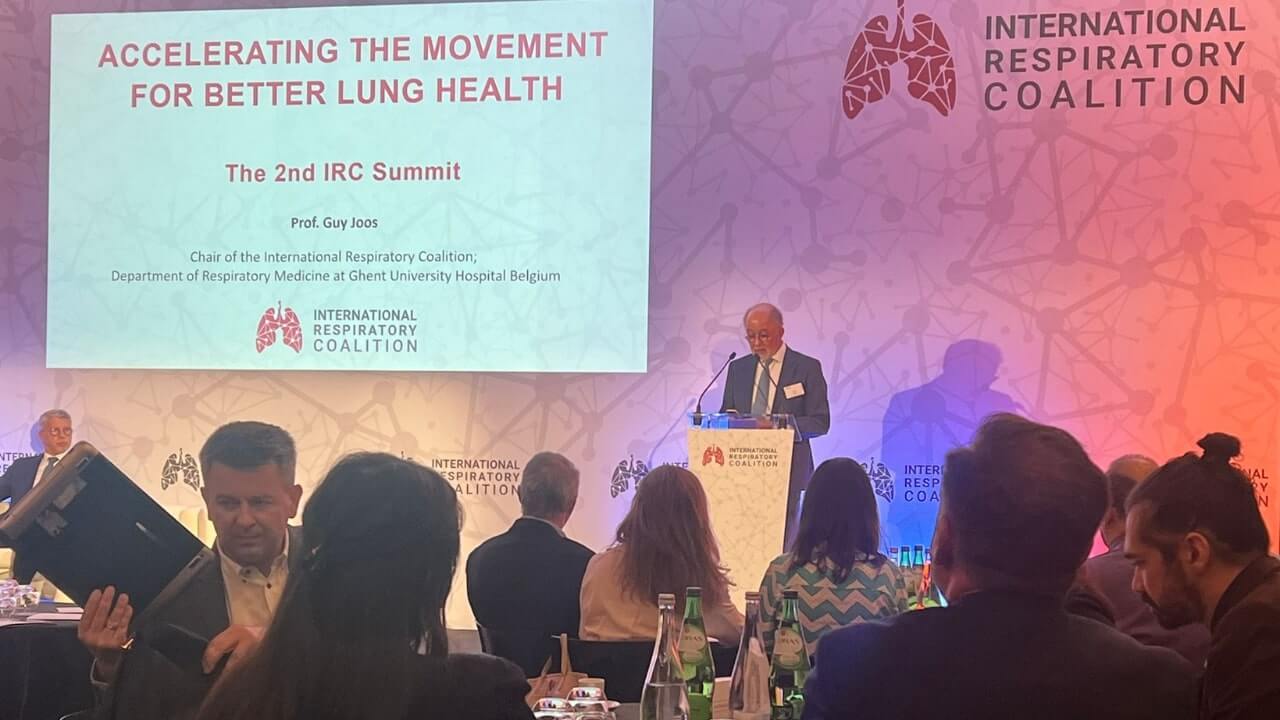The International Respiratory Coalition (IRC), led by the European Respiratory Society (ERS) in collaboration with healthcare professionals, patient groups and industry partners, has issued an official Manifesto, which sets out the aims and objectives of the Coalition and, using the latest data, explains a clear need to tackle respiratory disease. New research includes the benchmark societal cost for the most significant respiratory conditions across the World Health Organization (WHO) European region – totalling over €611 billion1.
The IRC is now calling on policymakers in WHO European region countries to create clear and measurable national strategies – to transform post-pandemic respiratory care and reduce mortality from respiratory diseases by a third globally by 2030, in line with the United Nations Sustainable Development Goals.
Analysis from the IRC Expert Group reveals a concerning gap in policy commitment, especially around prevention and diagnosis, for the most frequently diagnosed respiratory conditions, despite a continued rise in incidence and mortality rates across Europe. The next pandemic is also highly likely to be a respiratory illness2, and capacity building for respiratory health can help strengthen the eventual response.
The Chair of the IRC Operational Committee, Prof. Guy Joos, said: “At a time when our health services have never been under greater pressure, our economies are trying to bounce back from COVID-19 and prevalence of respiratory conditions is rapidly increasing, it is vital that we do more to improve the lives of people living with or at risk of respiratory disease.”
Over the past months, the IRC has welcomed 12 national-level IRC coalitions into its membership from Belgium, Croatia, France, Greece, Israel, Italy, Netherlands, Poland, Portugal, Turkey and the United Kingdom. These national groups convened at the IRC Summit in Portugal on 26 June, as the Manifesto was launched, and are fundamental to the success of this initiative – driving the development of national strategies.
With this Manifesto, the IRC is calling on governments and policymakers to establish funded national respiratory strategies, which include prevention, new models of care, ambitious measurable targets, and accountable leadership to improve lung health by focusing on better:
- Prevention of respiratory diseases – Implementing preventative approaches, increasing vaccination coverage rate across all ages and addressing the impacts of climate change and environmental pollution.
- Access to the right treatment at the right time – Lung health checks to aid earlier and more accurate diagnosis. Ensuring integrated primary, secondary, and tertiary care – fostering holistic patient management, improving access to evidence-based therapy and implementing respiratory guidelines at every level of care, with financial incentives to drive improvement.
- Action on reducing inequalities – Putting people and their rights at the centre of respiratory health and addressing the social determinants of poor health to improve accessibility and delivery of healthcare by prioritising marginalised and hard to reach communities for example, through better involvement of community leaders and health networkers.
- Prioritisation of research, data and insight to improve care – Focusing on research and insight into innovations in treatment and care to advance lung health, such as AI, use of real-world data and evidence, novel therapies, trials design, targeted research strategies and data registries to focus on inequality and areas of greatest need.
ERS President, Prof. Carlos Robalo Cordeiro added: “As a clinician, I know from experience that better action on respiratory conditions can save and improve lives, whilst also reducing hospitalisations and increasing the resilience and productivity of health services. But not enough is being done. It is shocking that although most respiratory diseases are preventable, concerted action has stalled.
“Urgent action is required to set and deliver clear and measurable national strategies for respiratory care in every country to lift this burden. The first step should be to establish population-wide lung health checks. This is because early detection of respiratory diseases can significantly increase the chances of survival and improve treatment outcomes and quality of life3.”
- Read the full IRC Manifesto
- Hear the latest from the IRC – follow the IRC Linkedin page
References
- International Respiratory Coalition, “Diseases – International Respiratory Coalition”, May 16, 2023, https://international-respiratory-coalition.org/lung-facts/diseases/
- Heymann et al, “The next pandemic – when could it be?”, 23 February 2023, https://www.chathamhouse.org/2022/02/next-pandemic-when-could-it-be
- NHS England, “Hundreds of people diagnosed with cancer early through life-saving NHS lung checks”, 19 April 2022, https://www.england.nhs.uk/2022/04/hundreds-of-people-diagnosed-with-cancer-early-through-life-saving-nhs-lung-checks/ increasing, it is vital that we do more to improve and save the lives of people living with or at risk of these many diseases.”





